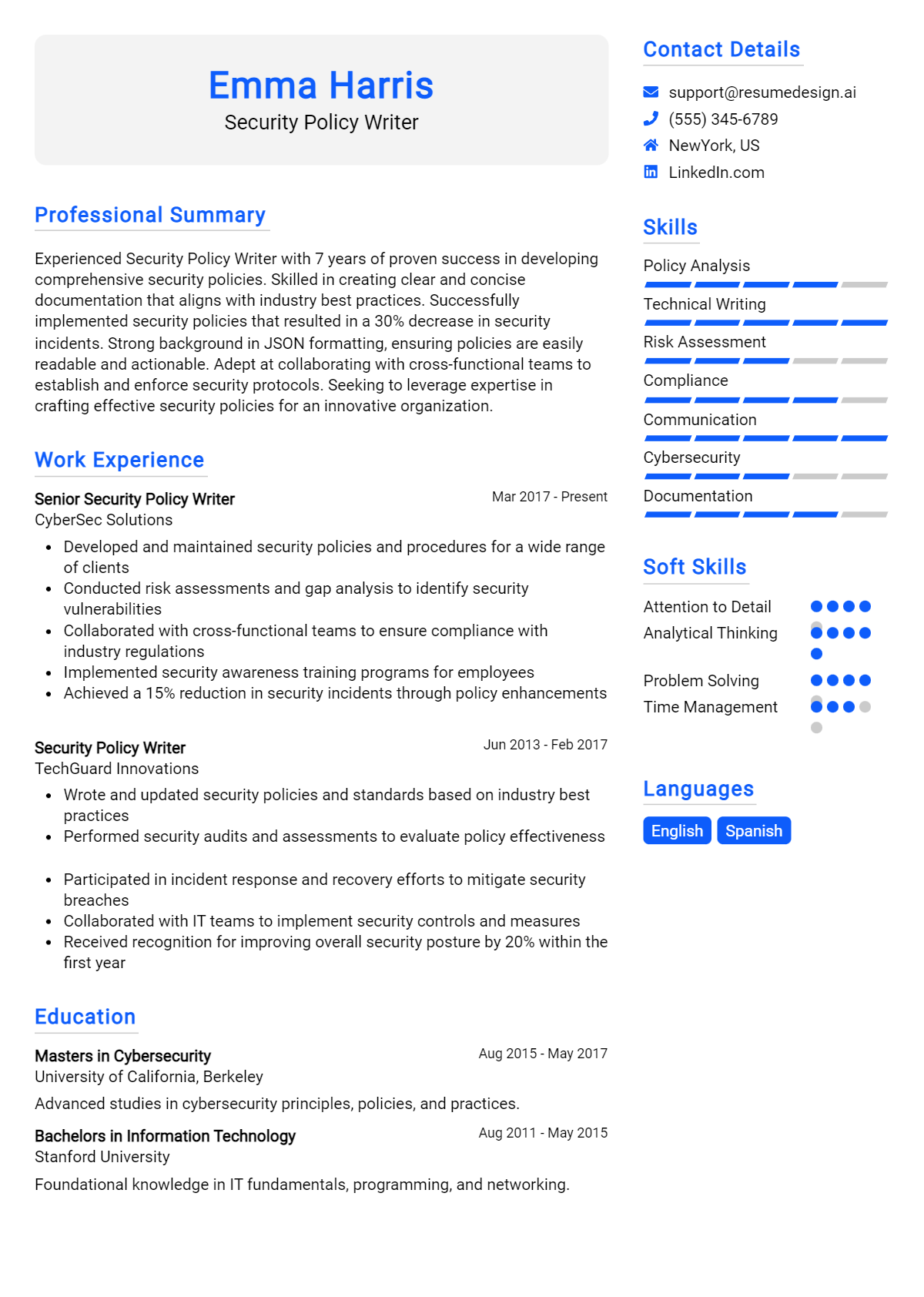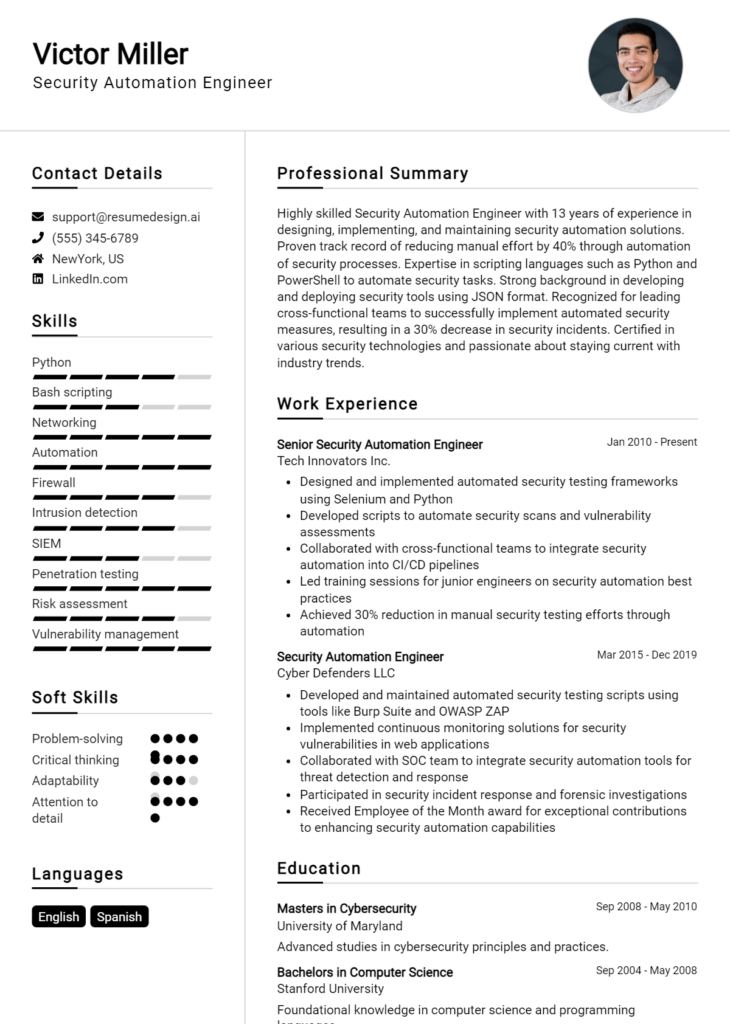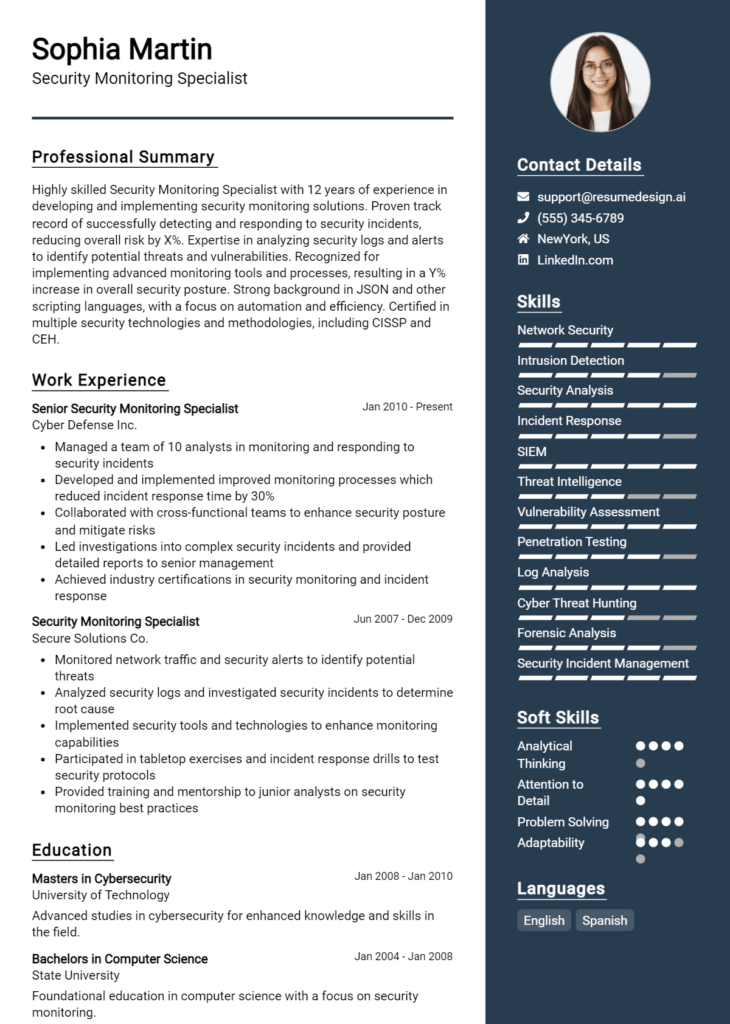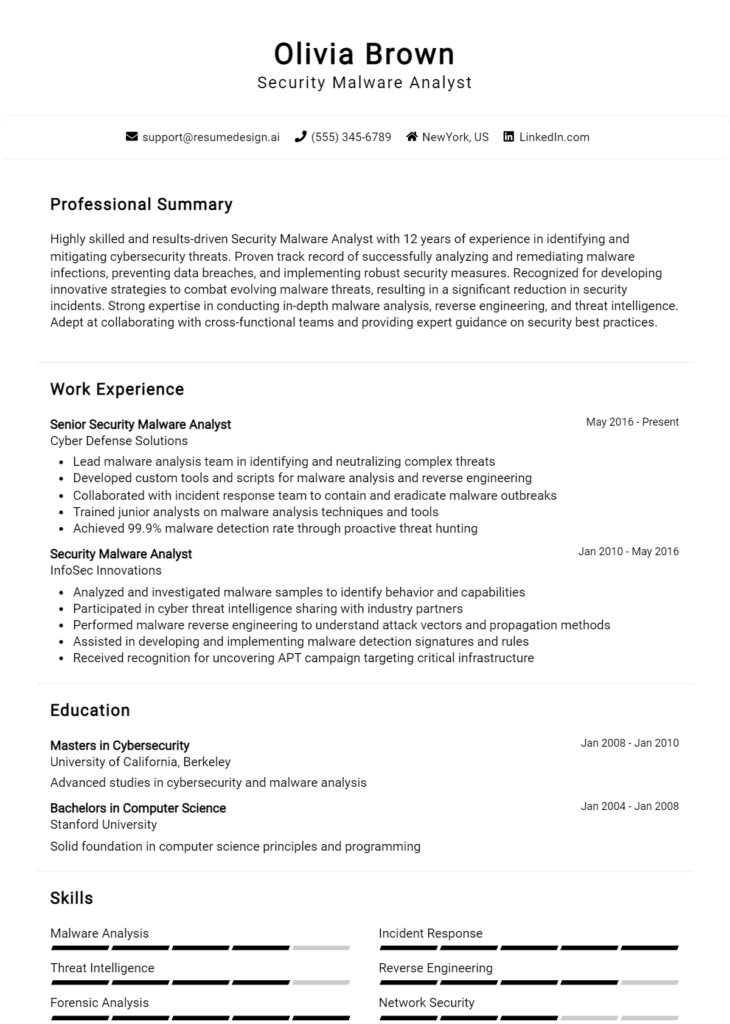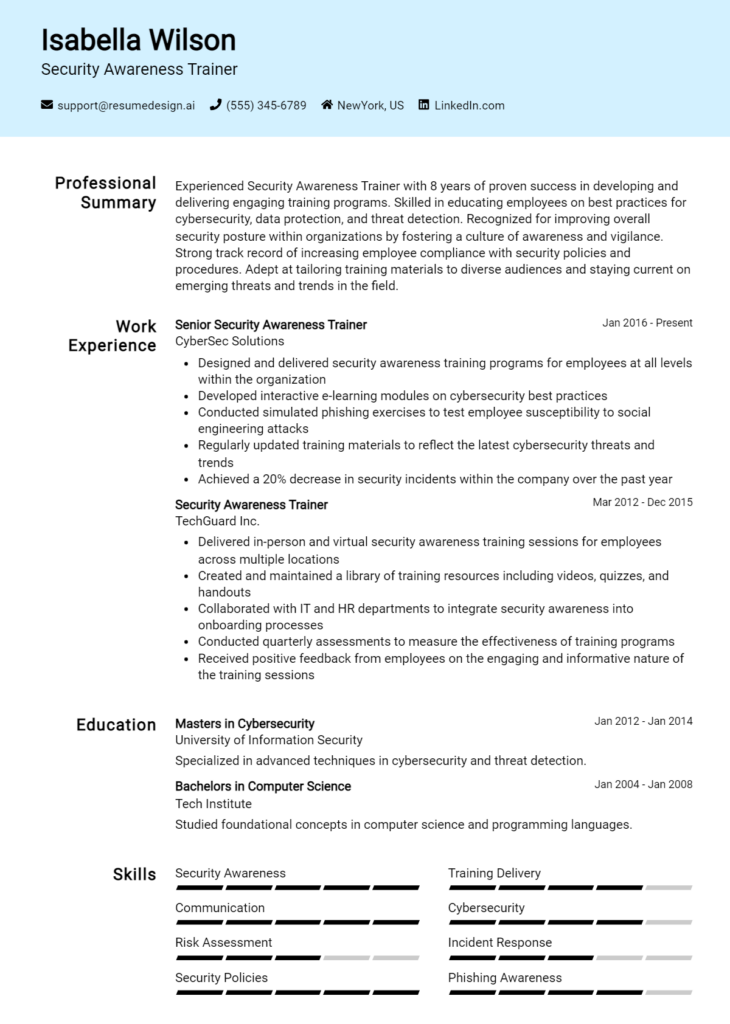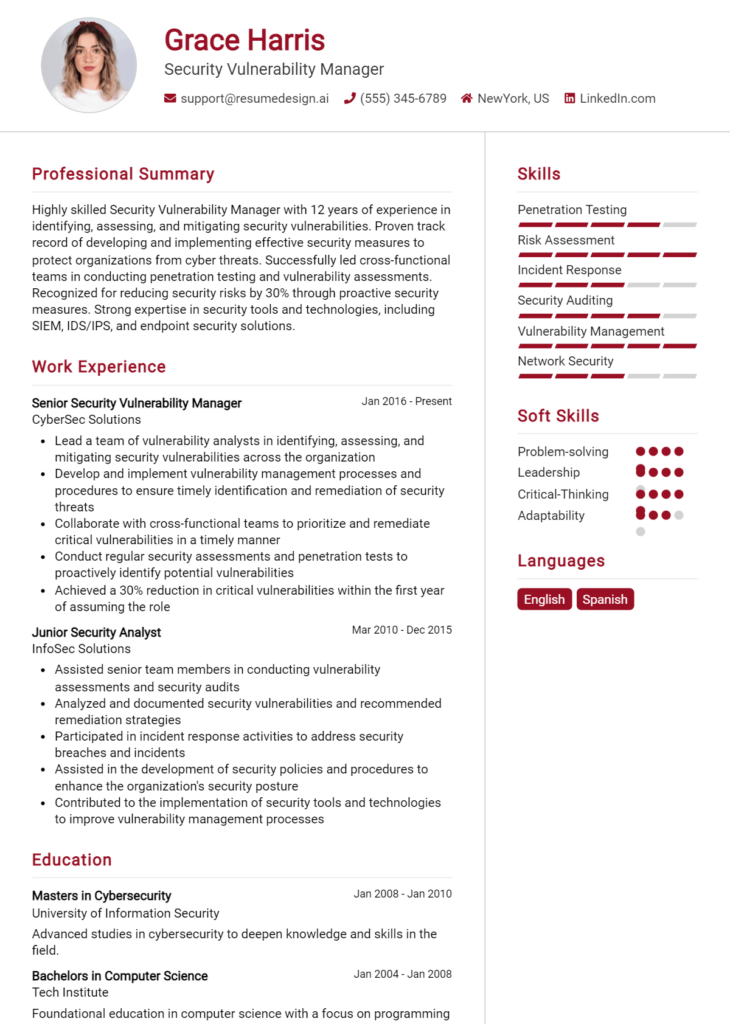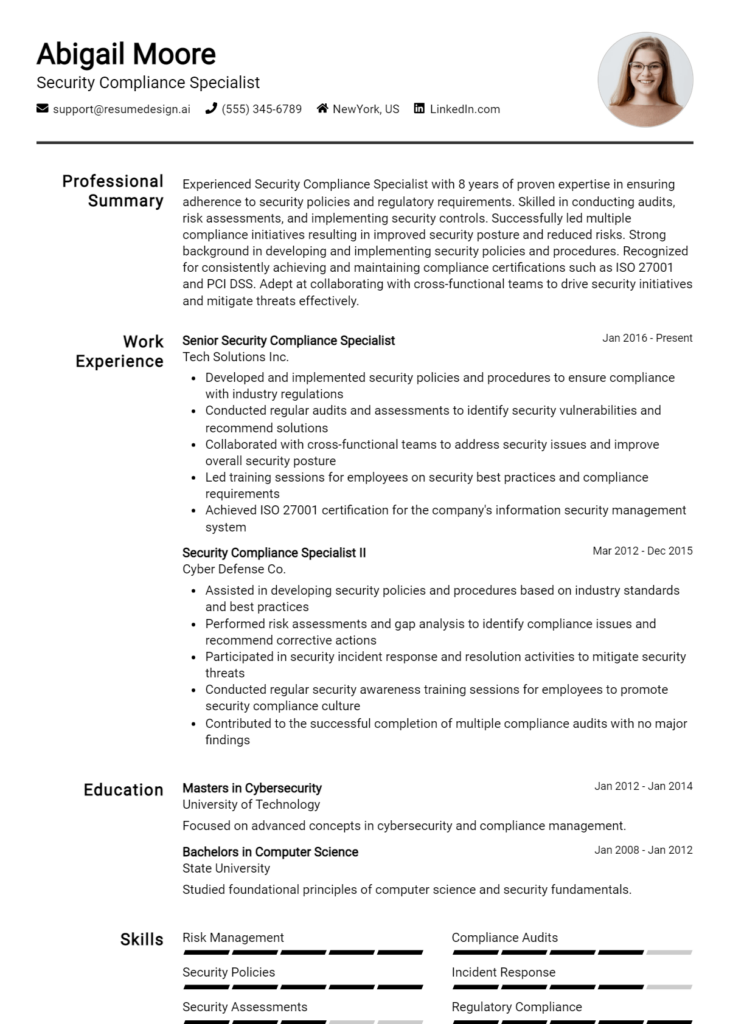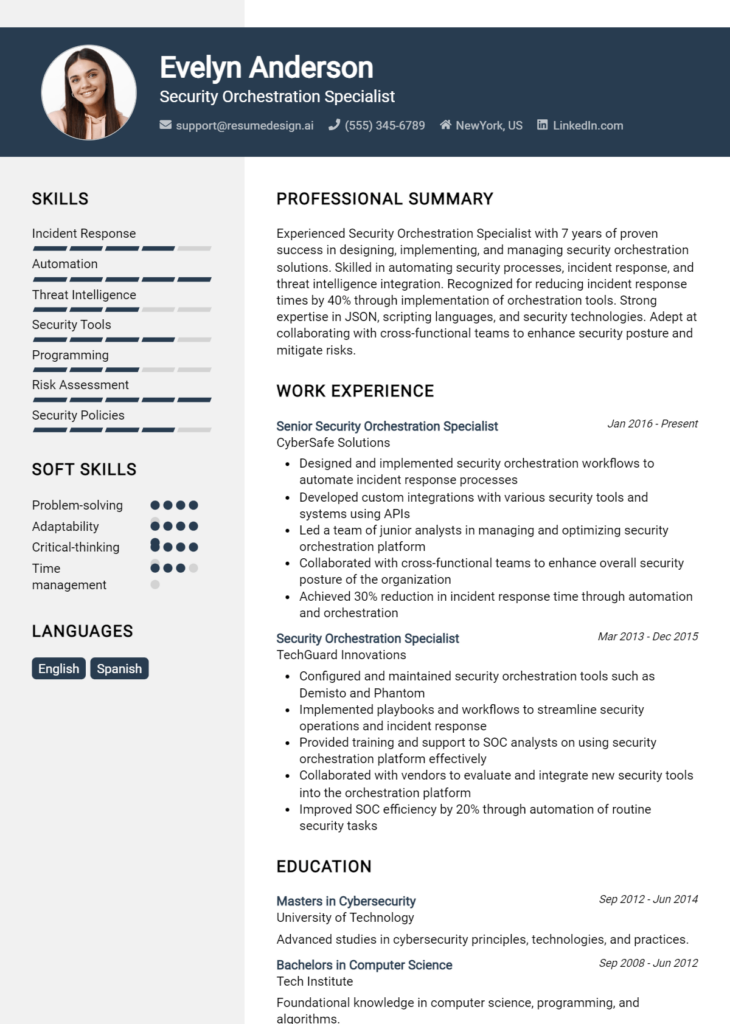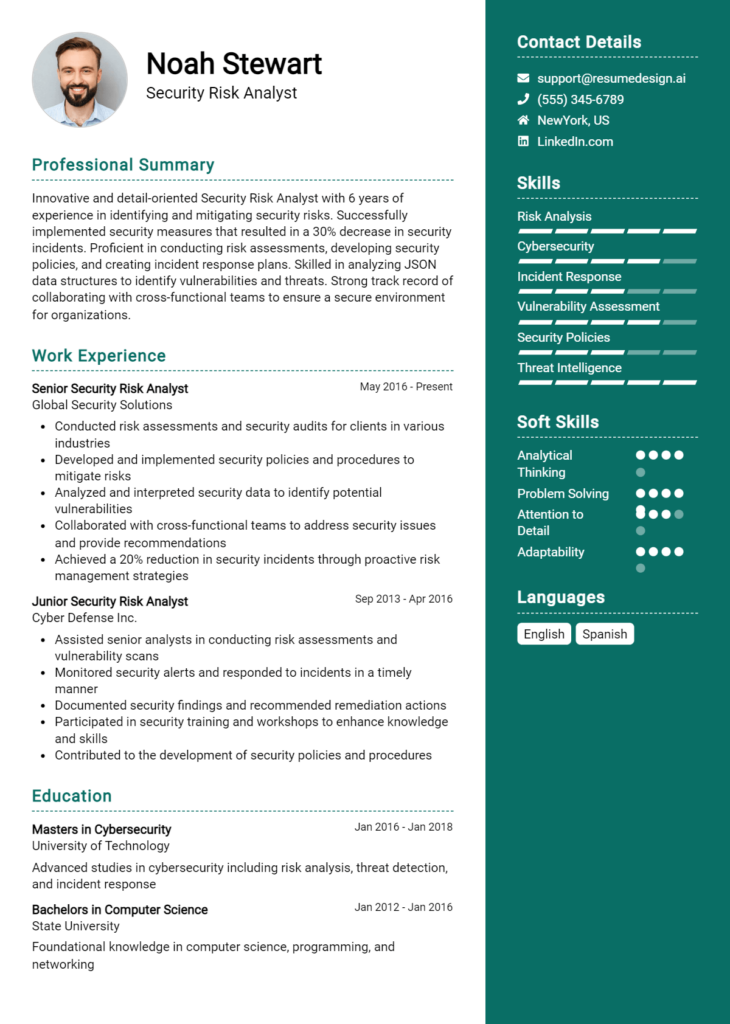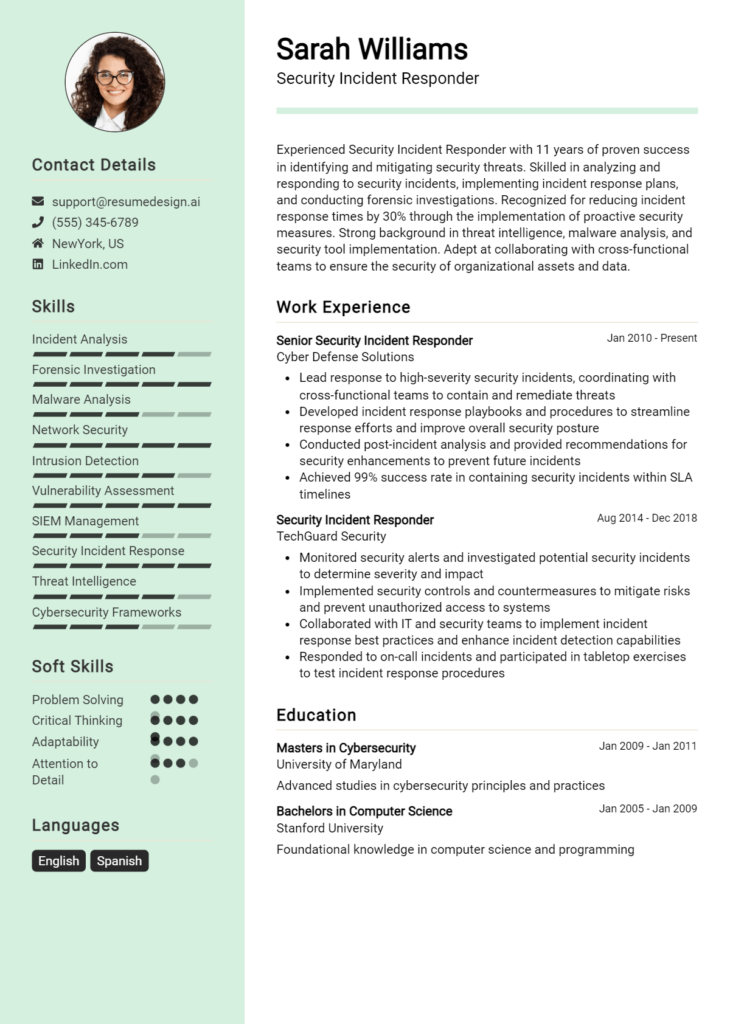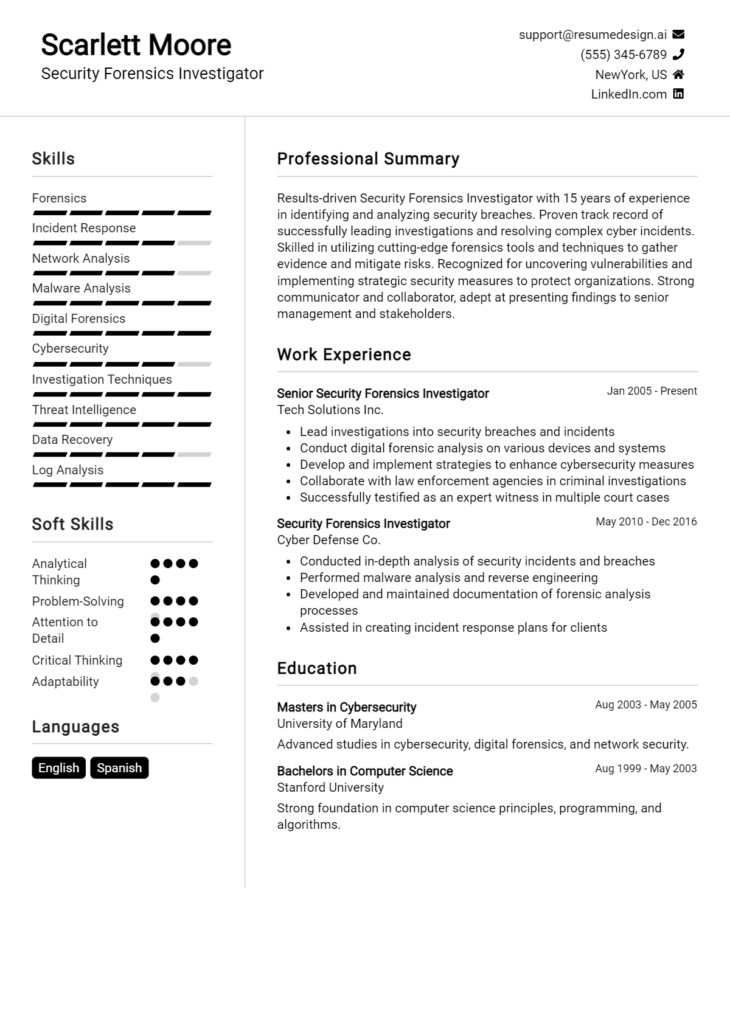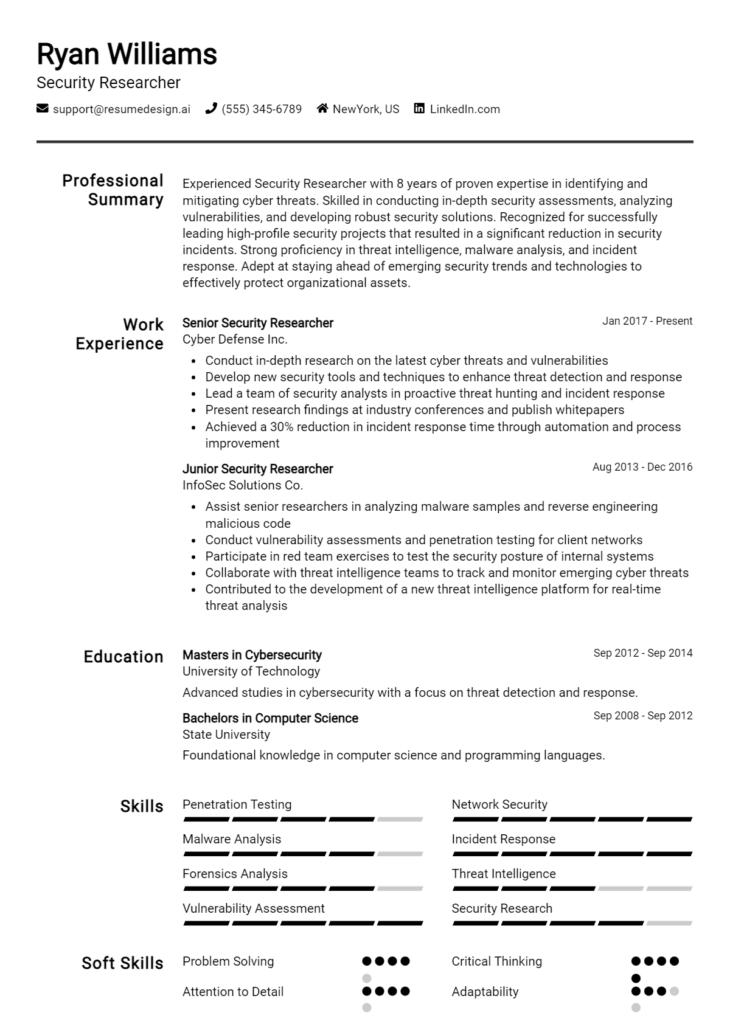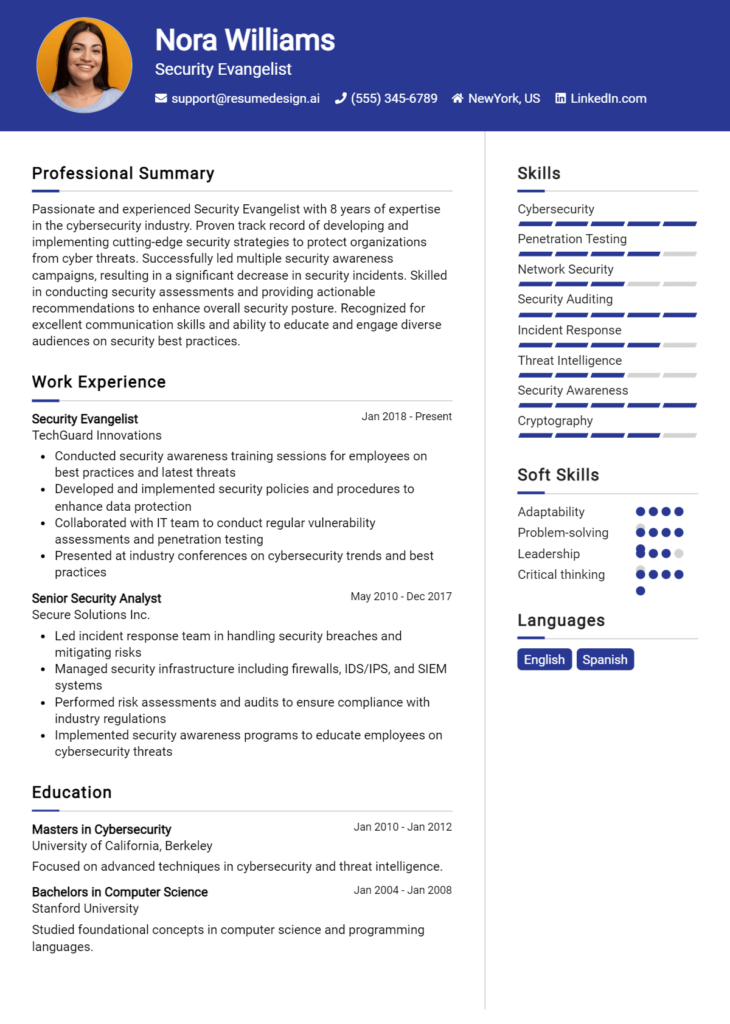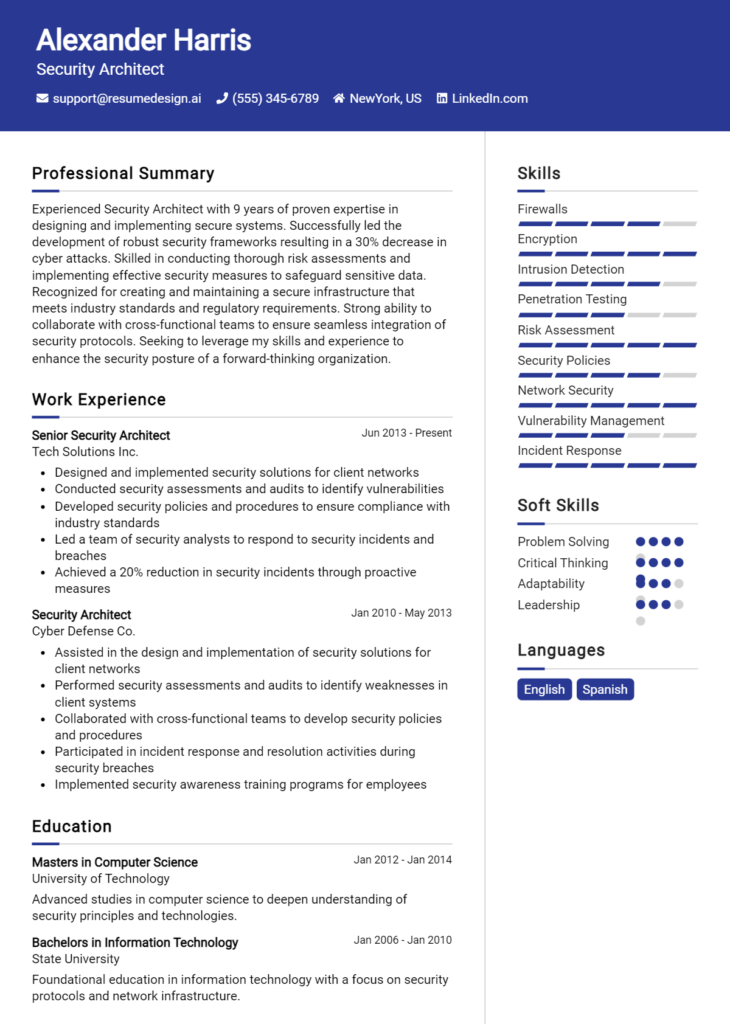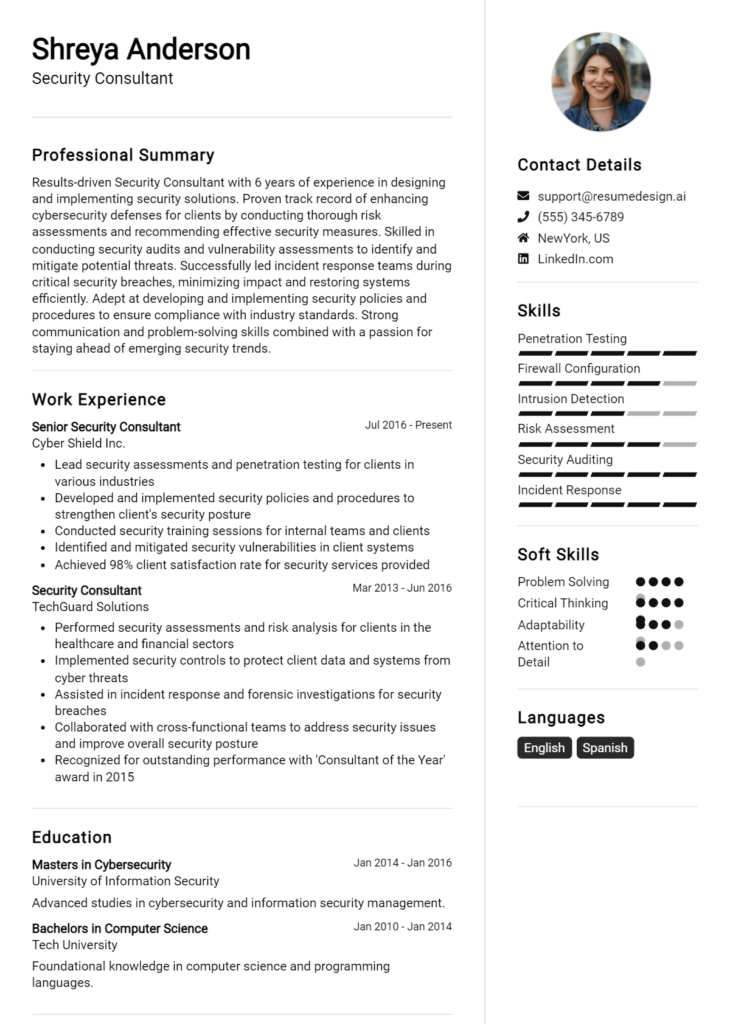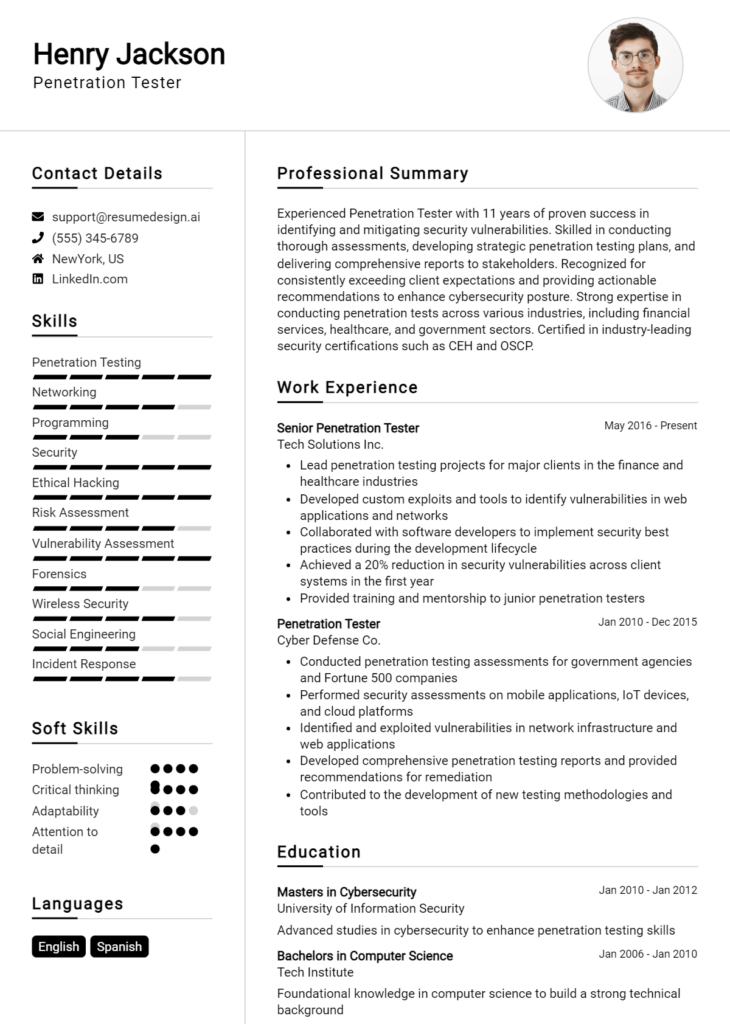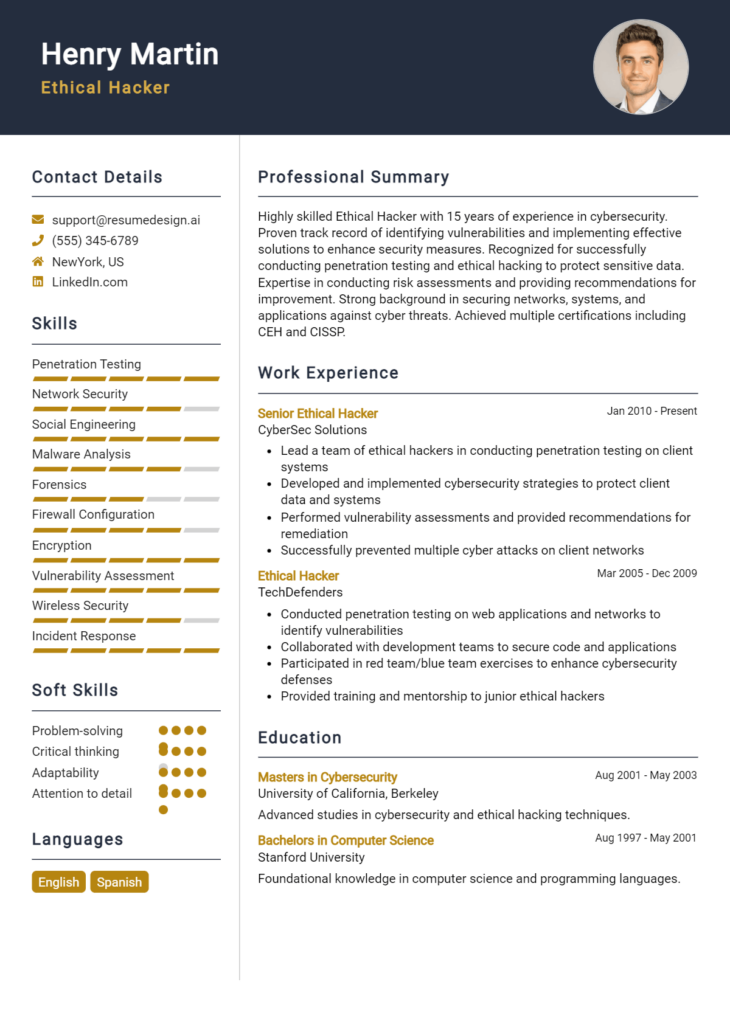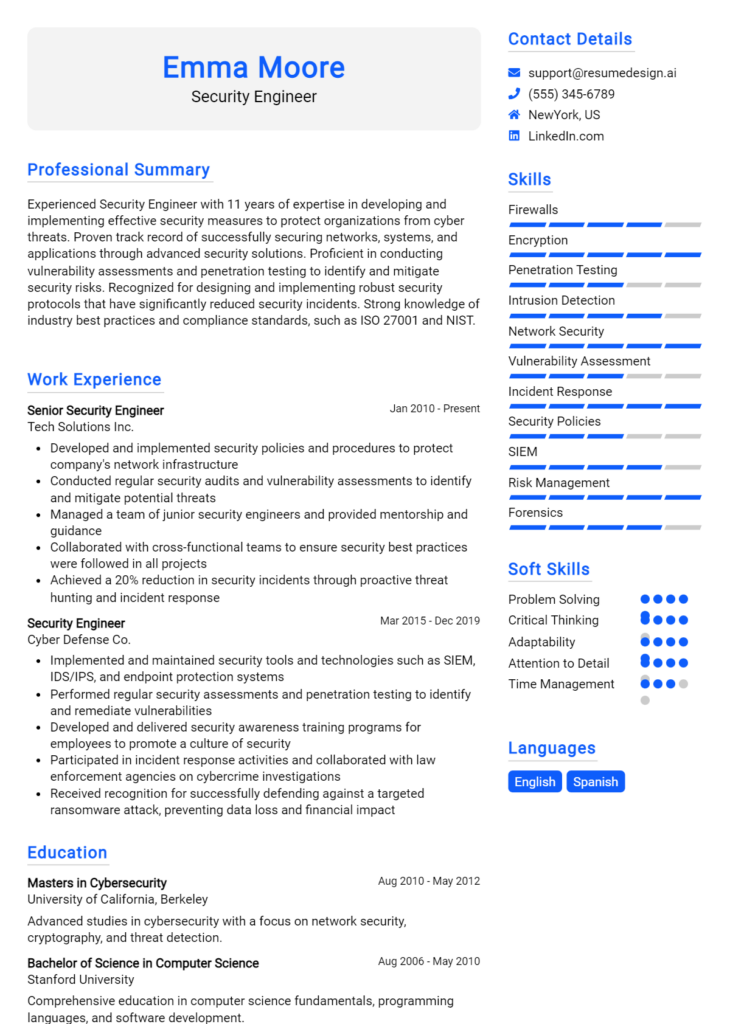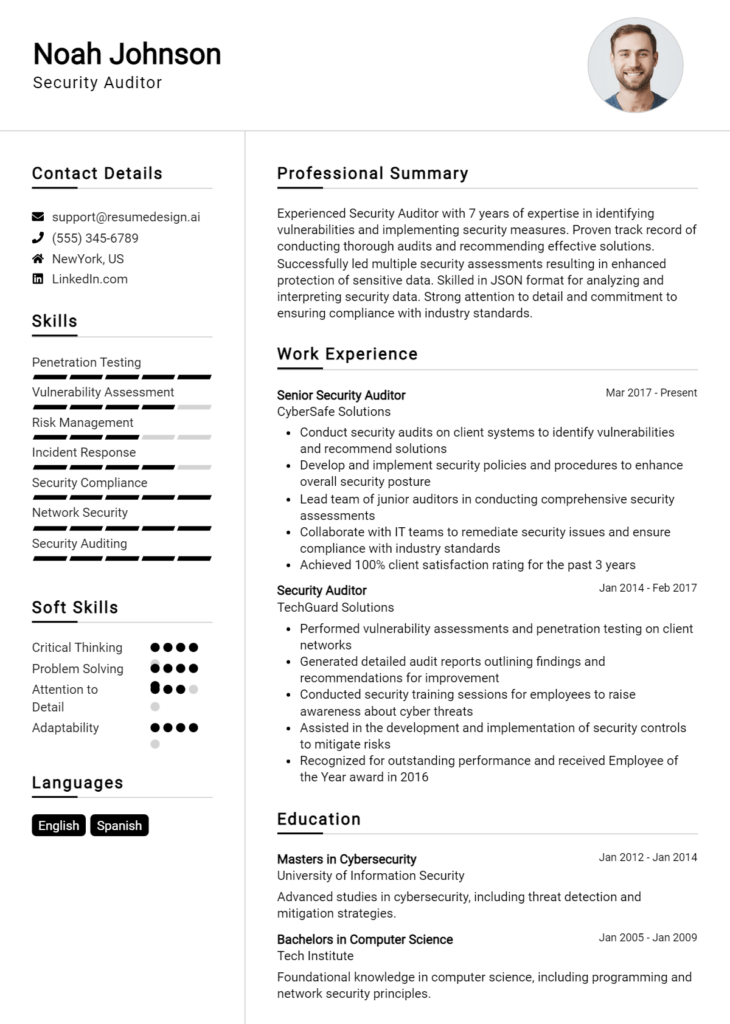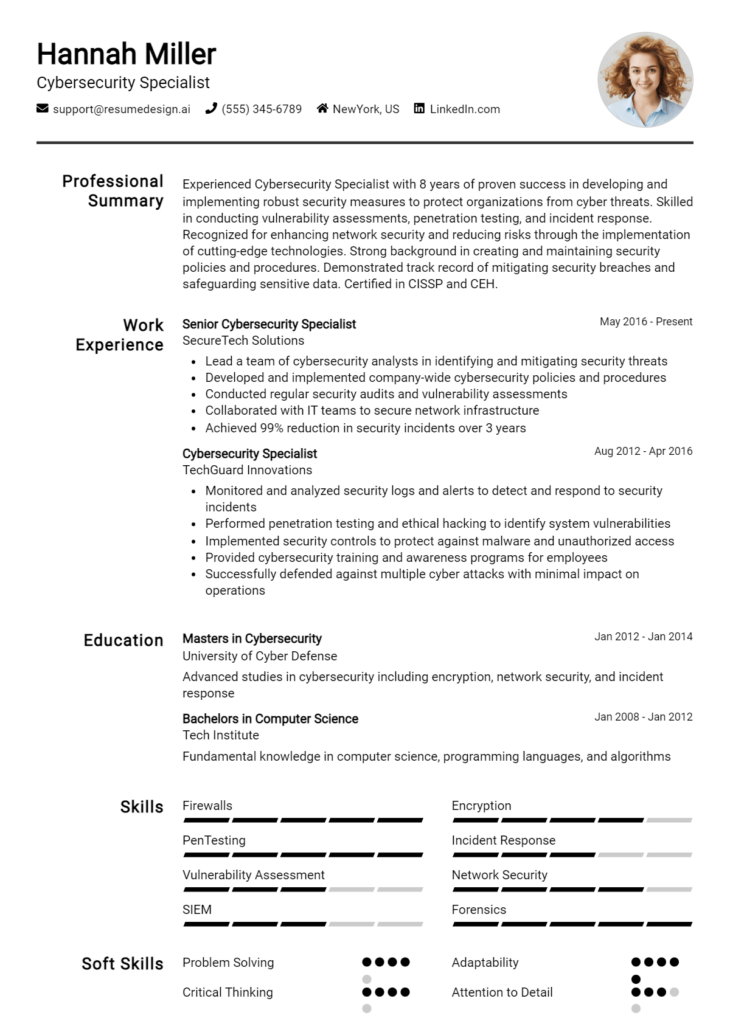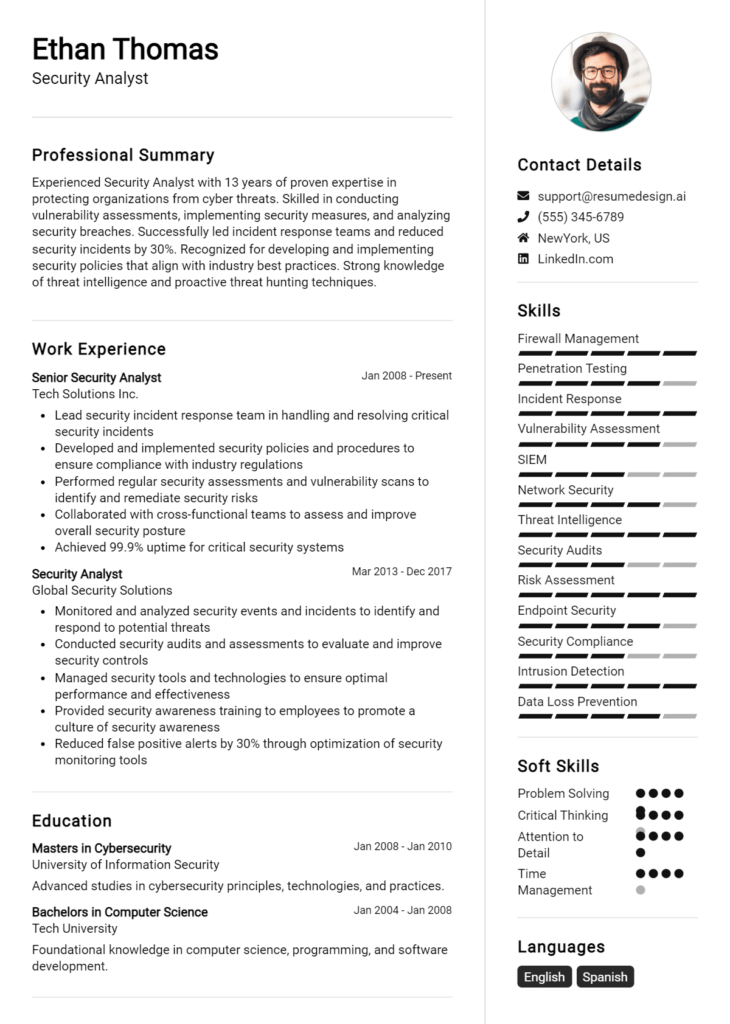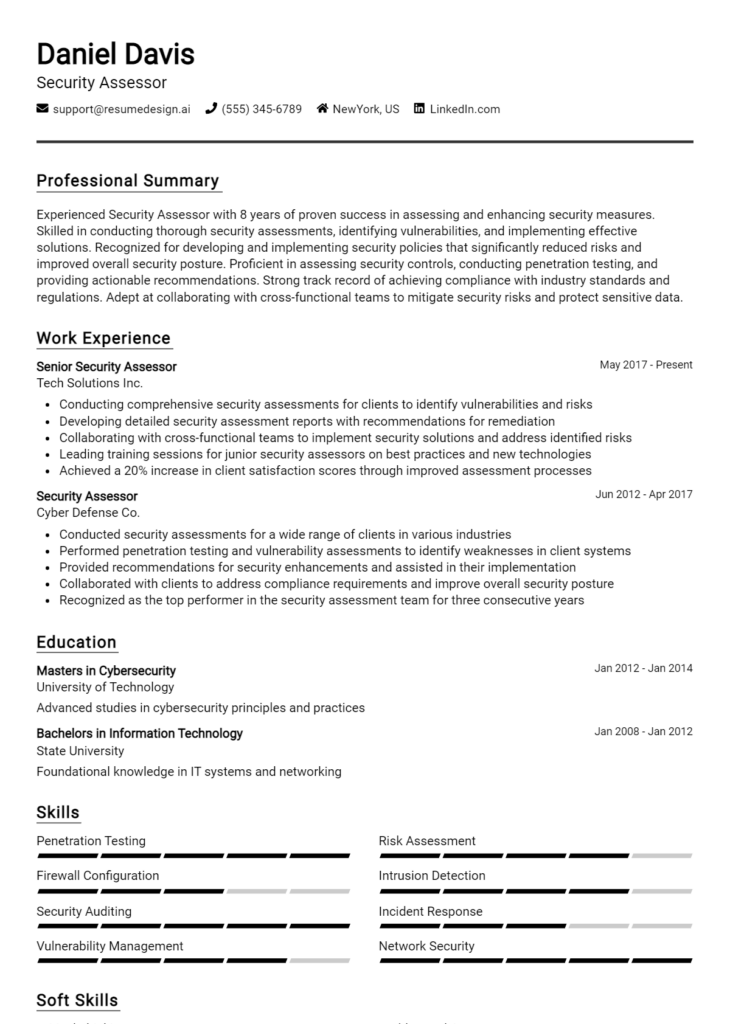Security Policy Writer Core Responsibilities
A Security Policy Writer plays a critical role in developing, reviewing, and maintaining security policies that safeguard an organization's assets. This professional bridges various departments by collaborating with IT, legal, and compliance teams to ensure policies align with operational needs and regulatory requirements. Strong technical knowledge, operational insight, and problem-solving skills are essential for crafting effective policies. These competencies contribute significantly to the organization's security posture, and a well-structured resume can effectively highlight these qualifications.
Common Responsibilities Listed on Security Policy Writer Resume
- Develop and draft comprehensive security policies and procedures.
- Collaborate with cross-functional teams to assess security needs.
- Review and update existing security policies to ensure compliance.
- Conduct risk assessments and identify potential security threats.
- Educate staff on security policies and best practices.
- Monitor changes in laws and regulations affecting security policies.
- Provide guidance on security-related incidents and responses.
- Participate in security audits and compliance checks.
- Gather feedback from stakeholders to refine policies.
- Research industry standards and emerging security trends.
- Prepare reports and presentations on security policy effectiveness.
High-Level Resume Tips for Security Policy Writer Professionals
In the competitive field of security policy writing, a well-crafted resume serves as the first impression a candidate makes on potential employers. This crucial document must effectively reflect not only your professional skills and qualifications but also your achievements in the realm of security policy development. As the gatekeeper to your next career opportunity, your resume should articulate your unique value proposition, highlighting your expertise in crafting policies that guide organizational security practices. This guide will provide practical and actionable resume tips specifically tailored for Security Policy Writer professionals, ensuring that your application stands out in a crowded job market.
Top Resume Tips for Security Policy Writer Professionals
- Tailor your resume to the job description by incorporating relevant keywords and phrases from the posting.
- Showcase your relevant experience by listing previous roles that involved policy writing, compliance, or risk management.
- Quantify your achievements, such as the number of policies developed or the percentage of risk reduction achieved through your initiatives.
- Highlight industry-specific skills, including knowledge of security frameworks (e.g., NIST, ISO), regulations (e.g., GDPR, HIPAA), and best practices.
- Include a professional summary that succinctly outlines your expertise and career goals in the security policy domain.
- Utilize bullet points for clarity and readability, making it easy for hiring managers to scan your qualifications quickly.
- Emphasize collaboration skills, demonstrating your ability to work with cross-functional teams to implement security policies.
- Incorporate relevant certifications such as Certified Information Systems Security Professional (CISSP) or Certified Information Security Manager (CISM).
- Keep your resume concise, ideally one to two pages, focusing on the most relevant information for the role.
- Proofread thoroughly to eliminate any spelling or grammatical errors, as attention to detail is crucial in security policy writing.
By implementing these tips, you can significantly enhance your resume and increase your chances of landing a job in the Security Policy Writer field. A polished and targeted resume not only showcases your qualifications but also demonstrates your professionalism and commitment to the security domain, making you a compelling candidate for prospective employers.
Why Resume Headlines & Titles are Important for Security Policy Writer
In the competitive field of security policy writing, a well-crafted resume headline or title is crucial for capturing the attention of hiring managers. A strong headline serves as a snapshot of a candidate's key qualifications, allowing them to immediately assess the applicant's relevance to the position. It should be concise, relevant, and directly aligned with the job being applied for, effectively summarizing the candidate’s expertise and value proposition in a single impactful phrase. A compelling resume headline not only piques interest but also sets the tone for the rest of the resume, guiding the reader to recognize the candidate's potential contributions to their organization.
Best Practices for Crafting Resume Headlines for Security Policy Writer
- Keep it concise: Aim for one to two lines that encapsulate your expertise.
- Be role-specific: Incorporate keywords related to security policy writing to align with job descriptions.
- Highlight key strengths: Focus on your most relevant skills, experiences, or achievements.
- Use action-oriented language: Employ strong verbs to convey your active role in past accomplishments.
- Tailor for each application: Customize your headline for each job to reflect the specific requirements.
- Include relevant certifications: If applicable, mention key certifications that bolster your qualifications.
- Avoid jargon: Use clear and straightforward language to ensure your headline is easily understood.
- Make it impactful: Use powerful adjectives to create a strong first impression.
Example Resume Headlines for Security Policy Writer
Strong Resume Headlines
Dynamic Security Policy Writer with 8+ Years of Experience in Cybersecurity and Risk Management
Certified Information Systems Security Professional (CISSP) Focused on Developing Robust Security Frameworks
Proven Expertise in Regulatory Compliance and Policy Development for Fortune 500 Companies
Weak Resume Headlines
Experienced Writer
Looking for Opportunities in Security
Strong headlines are effective because they are specific, relevant, and showcase the candidate's unique qualifications and experiences, immediately making them stand out in a stack of resumes. In contrast, weak headlines fail to convey any meaningful information about the candidate, often appearing generic and unremarkable. As a result, they do not capture the interest of hiring managers, who are looking for clear indicators of a candidate's fit for the role.
Writing an Exceptional Security Policy Writer Resume Summary
A well-crafted resume summary is essential for a Security Policy Writer, as it serves as the first impression a hiring manager will have of a candidate. This brief yet impactful section quickly captures attention by highlighting key skills, relevant experience, and notable accomplishments that align with the job role. A strong resume summary should be concise, compelling, and tailored specifically to the job for which the candidate is applying, ensuring that it resonates with the hiring manager and sets the stage for a deeper review of the candidate’s qualifications.
Best Practices for Writing a Security Policy Writer Resume Summary
- Quantify Achievements: Use numbers and metrics to showcase your impact, such as the percentage of policy compliance improvement.
- Focus on Relevant Skills: Highlight skills directly related to security policy writing, such as risk assessment, compliance knowledge, and technical writing.
- Tailor for the Job Description: Customize your summary to reflect the specific requirements and keywords found in the job listing.
- Highlight Certifications: Mention relevant certifications like CISSP or CISM to establish credibility and expertise.
- Showcase Industry Experience: Include specific industries you have worked in, such as finance or healthcare, that may be relevant to the position.
- Keep it Concise: Aim for 2-4 sentences that deliver maximum impact without overwhelming the reader.
- Use Action Verbs: Start sentences with strong action verbs to convey confidence and proactivity.
- Reflect Soft Skills: Incorporate soft skills such as communication and collaboration that are vital for effective policy writing and implementation.
Example Security Policy Writer Resume Summaries
Strong Resume Summaries
Detail-oriented Security Policy Writer with over 7 years of experience in developing and implementing security protocols for Fortune 500 companies, achieving a 30% reduction in compliance violations.
Proficient in crafting comprehensive security policies and risk management frameworks, leading to a 40% increase in policy adherence among employees in the financial services sector.
Certified Information Systems Security Professional (CISSP) with a proven track record of enhancing organizational security posture through effective policy development and training programs, resulting in a 25% decrease in security incidents.
Skilled in technical writing and analysis, with expertise in regulatory requirements, successfully steering compliance initiatives that improved audit scores by 50% in a high-stakes environment.
Weak Resume Summaries
Experienced writer with a background in security policies looking for a new opportunity.
Security policy professional who has worked in various roles and is seeking to leverage skills in a new position.
The examples are considered strong because they provide specific metrics and demonstrate relevant skills, showcasing the candidate's direct contributions to previous employers. Each strong summary clearly relates to the responsibilities of a Security Policy Writer, while the weak summaries lack specificity, measurable accomplishments, and do not convey the candidate's unique qualifications, resulting in a generic and unengaging presentation.
Work Experience Section for Security Policy Writer Resume
The work experience section of a Security Policy Writer resume is crucial as it serves as a platform to showcase the candidate's technical skills, leadership capabilities, and their ability to deliver high-quality security documentation. This segment not only reflects the practical application of knowledge in real-world scenarios but also highlights the candidate's achievements in previous roles. By quantifying accomplishments and aligning experiences with industry standards, candidates can effectively demonstrate their value to prospective employers, making it clear how their background aligns with organizational needs in the ever-evolving field of cybersecurity.
Best Practices for Security Policy Writer Work Experience
- Highlight specific technical skills relevant to security policy development.
- Quantify achievements with metrics, such as reductions in breaches or compliance rates.
- Emphasize collaboration with cross-functional teams to create comprehensive policies.
- Detail leadership roles in projects that required managing teams or stakeholders.
- Include industry-standard frameworks or methodologies utilized in past roles.
- Use action verbs to convey a sense of accomplishment and initiative.
- Tailor the experience to align with the job description and industry trends.
- Showcase continuous learning and certifications relevant to security policy writing.
Example Work Experiences for Security Policy Writer
Strong Experiences
- Developed a comprehensive security policy framework that reduced security incidents by 30% over two years, enhancing compliance with ISO 27001 standards.
- Led a cross-departmental team of five in the creation of a new risk assessment procedure, resulting in a 25% increase in compliance audit scores.
- Implemented a policy management system that streamlined documentation processes, decreasing policy update time by 40% while improving stakeholder engagement.
- Conducted training sessions for over 100 employees on new security policies, leading to a 50% reduction in compliance violations within the first year.
Weak Experiences
- Worked on various security policies without specific details about the projects or outcomes.
- Assisted in the development of some security guidelines, lacking clarity on the impact or scope of involvement.
- Participated in team meetings regarding security matters, but did not contribute to measurable results.
- Contributed to a policy document that was never implemented or evaluated.
The examples provided illustrate a clear distinction between strong and weak experiences. Strong experiences are characterized by quantifiable outcomes, active leadership, and collaborative efforts that align with industry standards, demonstrating the candidate's ability to drive significant improvements within an organization. In contrast, weak experiences lack specificity, measurable results, and clear contributions, making it difficult for potential employers to assess the candidate's true capabilities and impact in previous roles.
Education and Certifications Section for Security Policy Writer Resume
The education and certifications section of a Security Policy Writer resume is crucial, as it serves as a testament to the candidate's academic background, industry-relevant certifications, and commitment to continuous learning. This section not only showcases formal education but also emphasizes specialized training and coursework pertinent to the field of security policy. By highlighting relevant degrees and recognized certifications, candidates can greatly enhance their credibility and demonstrate their alignment with the specific requirements of the job role, making them more appealing to potential employers.
Best Practices for Security Policy Writer Education and Certifications
- Include degrees that are directly related to security, information technology, or policy writing.
- List certifications from recognized industry bodies, such as CISSP, CISM, or Security+.
- Highlight relevant coursework that pertains to security policy development and risk management.
- Keep the format consistent, ensuring clarity and ease of reading.
- Indicate the year of completion for degrees and certifications to showcase recent achievements.
- Prioritize advanced degrees or certifications that demonstrate a higher level of expertise.
- Include any ongoing education or training programs that reflect commitment to staying current in the field.
- Tailor the section to align with the specific job description and requirements where possible.
Example Education and Certifications for Security Policy Writer
Strong Examples
- M.S. in Cybersecurity Policy, University of XYZ, 2022
- CISSP (Certified Information Systems Security Professional), 2023
- Certified Information Security Manager (CISM), 2023
- Coursework in Risk Management and Data Protection, University of XYZ
Weak Examples
- B.A. in English Literature, University of ABC, 2010
- Certification in Basic Computer Skills, 2015
- Online Course in Creative Writing, 2021
- High School Diploma, 2008
The strong examples are considered relevant because they align directly with the requirements of a Security Policy Writer, showcasing advanced degrees and recognized certifications that reflect the candidate's expertise in security and policy writing. In contrast, the weak examples illustrate qualifications that lack relevance to the field, such as degrees and certifications that do not pertain to security or policy development, ultimately undermining the candidate's suitability for the role.
Top Skills & Keywords for Security Policy Writer Resume
The role of a Security Policy Writer is critical in safeguarding an organization’s digital assets and ensuring compliance with various regulations. A well-crafted resume that highlights both hard and soft skills can significantly enhance a candidate's prospects in this competitive field. Skills in this role not only demonstrate technical proficiency but also showcase the ability to communicate complex policies effectively. Employers look for candidates who can translate security measures into clear, actionable guidelines, making it essential to tailor your resume to reflect both your expertise and interpersonal abilities. For more insight on how to effectively showcase your skills and work experience, consider the following key competencies that are indispensable for Security Policy Writers.
Top Hard & Soft Skills for Security Policy Writer
Soft Skills
- Excellent written and verbal communication
- Strong analytical thinking
- Attention to detail
- Problem-solving skills
- Adaptability and flexibility
- Collaboration and teamwork
- Time management
- Critical thinking
- Active listening
- Ability to work under pressure
Hard Skills
- Knowledge of cybersecurity frameworks (e.g., NIST, ISO 27001)
- Proficiency in risk assessment methodologies
- Familiarity with compliance regulations (e.g., GDPR, HIPAA)
- Technical writing and documentation
- Experience with security policy development
- Understanding of network protocols and security technologies
- Data loss prevention strategies
- Incident response planning
- Familiarity with security audit processes
- Proficiency in using security tools and software
Stand Out with a Winning Security Policy Writer Cover Letter
Dear Hiring Manager,
I am writing to express my interest in the Security Policy Writer position at [Company Name], as advertised on [Job Portal/Company Website]. With a robust background in cybersecurity and extensive experience in drafting security policies, I am excited about the opportunity to contribute to your team. My expertise in creating comprehensive, clear, and actionable security policies aligns perfectly with your vision of maintaining a strong security posture.
In my previous role at [Previous Company], I successfully developed and implemented security policies that not only complied with industry regulations but also addressed the unique needs of our organization. By collaborating closely with IT, legal, and compliance teams, I ensured that the policies were not only technically sound but also easily understood by all employees. My ability to translate complex security concepts into straightforward language has proven to be invaluable in fostering a culture of security awareness and compliance within the organization.
I am particularly drawn to [Company Name] because of its commitment to innovation and excellence in security practices. I believe my proactive approach to identifying potential security risks and my meticulous attention to detail will significantly contribute to your efforts in enhancing organizational security. I am eager to bring my skills in policy writing and my passion for cybersecurity to your esteemed company.
Thank you for considering my application. I look forward to the possibility of discussing how my experience and vision align with the goals of [Company Name]. I am excited about the opportunity to contribute to your security initiatives and help drive a culture of security excellence within your organization.
Sincerely,
[Your Name]
[Your Contact Information]
Common Mistakes to Avoid in a Security Policy Writer Resume
When crafting a resume for a Security Policy Writer position, it's crucial to present your skills and experiences in a compelling manner. However, many candidates make common mistakes that can hinder their chances of landing an interview. Understanding these pitfalls can help you create a more effective resume that stands out to hiring managers. Here are some common mistakes to avoid:
Generic Objective Statements: Using a vague or generic objective statement can make your resume blend in with others. Instead, tailor your objective to reflect your specific goals and how they align with the organization's needs.
Lack of Relevant Keywords: Failing to include industry-specific keywords can lead to your resume being overlooked by Applicant Tracking Systems (ATS). Review job descriptions carefully and incorporate relevant terminology.
Overly Technical Language: While a strong understanding of security concepts is essential, using too much jargon or overly complex language can alienate some readers. Aim for clarity and simplicity to ensure your message is accessible.
Ignoring Achievements: Simply listing job responsibilities without highlighting accomplishments can weaken your resume. Focus on quantifiable achievements that demonstrate your impact and effectiveness in previous roles.
Not Tailoring for Each Application: Sending out the same resume for multiple positions can be detrimental. Customize your resume for each application to reflect the specific skills and experiences that align with the job description.
Neglecting Formatting and Readability: A cluttered or poorly formatted resume can distract from your qualifications. Use clear headings, bullet points, and a professional layout to enhance readability and visual appeal.
Skipping Soft Skills: Security policy writing is not solely about technical skills; soft skills like communication, collaboration, and problem-solving are equally important. Be sure to highlight these abilities throughout your resume.
Omitting Continued Education or Certifications: In the ever-evolving field of security, it’s essential to showcase any relevant certifications or continued education. Failing to include these can make your resume feel outdated and less competitive.
Conclusion
In summary, the role of a Security Policy Writer is crucial in today’s digital landscape, where the protection of sensitive information and compliance with regulations are paramount. A successful Security Policy Writer must possess strong writing skills, a deep understanding of security protocols, and the ability to translate complex technical information into clear, actionable policies. Key responsibilities include developing, reviewing, and updating security policies and procedures, as well as collaborating with various stakeholders to ensure alignment with organizational goals.
As you reflect on this essential role, it’s time to take action! Review your Security Policy Writer resume to ensure it highlights your relevant skills and experiences effectively. Utilize available resources to enhance your application: explore resume templates to find a design that suits your style, use the resume builder for a streamlined approach, check out resume examples for inspiration, and don’t forget to craft a standout cover letter with the help of cover letter templates. Start your journey towards securing your next opportunity today!

